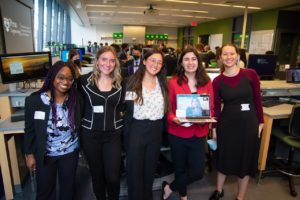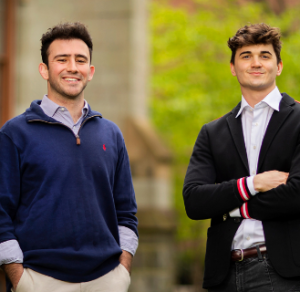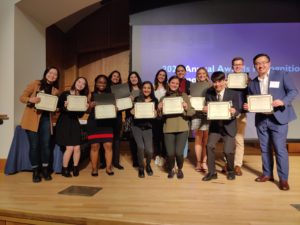William Danon and Luka Yancopoulos, winners of the 2022 President’s Innovation Prize, will offer a software solution to make the health care supply chain more efficient.
by Brandon Baker
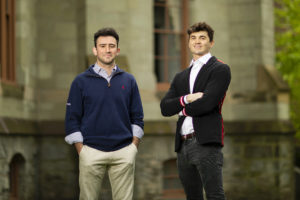
William Danon and Luka Yancopoulos are best friends. They’re also business partners.
The duo, who received this year’s President’s Innovation Prize (PIP) for Grapevine, met during sophomore year, connected through Yancopoulos’ roommate. As time went on, they did everything together: cooked meals, played basketball, and read and discussed fantasy novels.
“We spent a lot of time together,” Danon says.
It was only natural, then, that when the time came to start an actual venture, they’d do it together.
“They’re like brothers, in a very good way,” says mentor David Meaney of the School of Engineering and Applied Science, who describes their working dynamic as “complementary.” “I think that will serve them well. Most of what we do in faculty is collaborative, and I see elements of that in their partnership. I give them credit for stepping out and doing something unusual and keeping at it.”
How Grapevine came to be
Grapevine is a software solution and professional networking platform that connects small-to-medium-size players in the health care supply chain. It’s a sort of two-pronged solution: It helps institutions like hospital systems connect disjointed operations like procurement and inventory management internally, but also serves as a glue between these institutions and purveyors of medical equipment.
“William and Luka are impact-driven entrepreneurs whose collaborative synergies will take them far,” says Penn Interim President Wendell Pritchett. “The software provided by Grapevine is poised to reinvent how the health care industry buys and sells medical supplies and services and, truly, could not come at a timelier moment.”
The company is the evolution of a project they began at the onset of the COVID-19 pandemic, called Pandemic Relief Supply, which delivered $20 million of health care supplies to frontline workers.
“My mom was a nurse practitioner at New York Presbyterian Hospital, the largest hospital in the United States, and she was coming home with horror stories,” recalls Yancopoulos. “In surgery or the ER, a surgeon had to put on a garbage bag because they didn’t have a gown. And they gave her one mask to use for the rest of the month, and I’m seeing on the news, ‘Don’t wear a mask for more than three days.’”
This is where Yancopoulos and Danon first developed an interest in the health care supply chain. Using a database Penn allows students access to that maps the import of any good in the country, they did keyword matching to identify instreams of different goods and handed off findings to New York Presbyterian procurement staff. When McKesson, the largest provider of health care products and services in the U.S., took notice of what they were doing and reached out, they realized they were onto something. In response to their success, they started a company called Pandemic Relief Supply to distribute reliable medical supplies, including items like medical-grade masks and gloves, to frontline workers in the healthcare space.
As time passed, that project evolved into something larger: Grapevine.

In short, Grapevine’s software creates a professional networking platform to resolve miscommunications between suppliers and buyers, as well as adds a layer of transparency between interactants. Suppliers on the platform display real-time data about their inventory and shipping process, with timestamps; this prohibits companies from cherry-picking data or making false claims and creates a more health-care-supply-specific space for companies to interact than, say, LinkedIn.
“Primarily, the first step is we want people to use it internally, and streamline operations, and then through that centralized operational data, you can push that externally and that’s where [Grapevine] becomes a connector,” explains Danon. “Because when you’re choosing to connect with someone, the reason you can do so way more efficiently or quickly, is that data is actual operational data.”
To accomplish this level of transparency, the beginnings of Grapevine involved lots of legwork. Last year, the duo moved to Los Angeles to take stock of what suppliers existed where, and how reliable they were. They realized that many suppliers existed around Los Angeles because of port access; many medical supplies are imported from Asia. Their time in LA made the problem feel even more tangible, they agree.
“We were able to see people were doing outdated processes—manual processes—because there’s no other option,” Danon says. “So, we said, ‘Let’s get out there and do some work to be digital and technologically innovative.”
Read the full story in Penn Today.
N.B.: Yancopolous’s senior design team created “Harvest” for their capstone project in Bioengineering, building on the existing Grapevine software package. Read Harvest’s abstract and view their final presentation on the BE Labs website.

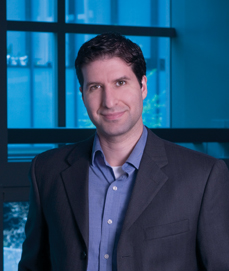
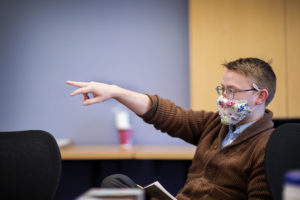

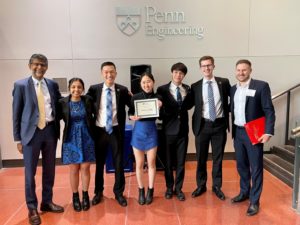
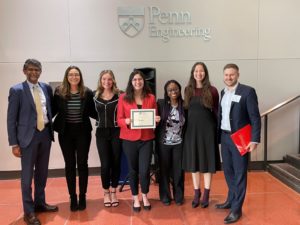
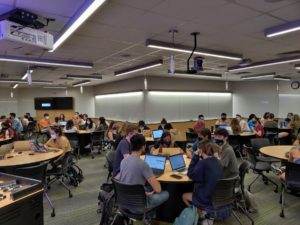 After a year of hybrid learning, Penn Bioengineering (BE) seniors were excited to return to the
After a year of hybrid learning, Penn Bioengineering (BE) seniors were excited to return to the 